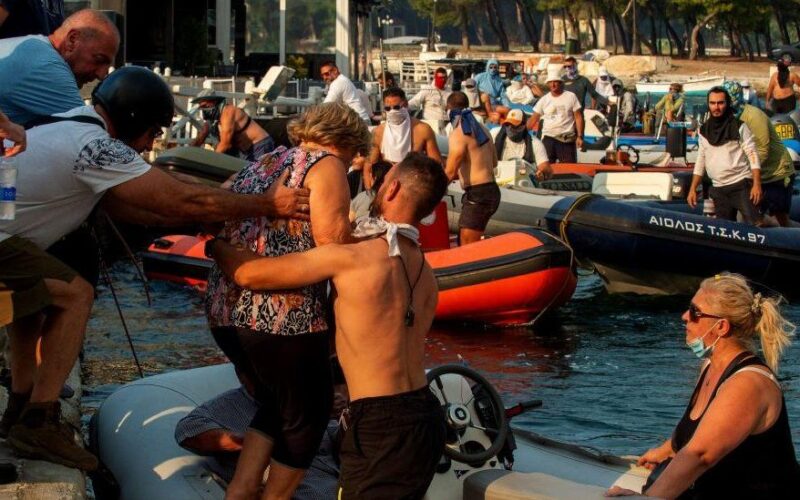A security zone has been set up around a Greek air force base after wildfires triggered powerful explosions at an ammunition depot on Thursday.
Shock waves were felt miles away and 133 residents of the nearby town of Nea Anchialos escaped by sea.
The coastal base is home to Greece’s 111 Combat Wing, and F-16 planes flew to another base as a precaution.
F-16 missiles and bombs are stored at the depot 6km (3.7 miles) north of the planes and the runway.
As the wildfire reached the western end of the base on Thursday evening, police set up a perimeter and the area was rocked by several powerful explosions, including a dramatic blast heard at 19:18 (16:18 GMT).
No-one was hurt, but windows were shattered in Nea Anchialos and several villages in the area were evacuated as church bells rang out warning residents to leave their homes.
The shock waves were felt some distance up the coast of the Magnesia region in the city of Volos. A major wine co-operative just outside Nea Anchialos went up in flames.
Greece has endured two weeks of fire emergencies, which have seen thousands of holidaymakers and residents fleeing some of its popular destinations.
The continuing crisis prompted Citizen Protection Minister Notis Mitarakis to resign for “personal reasons”. The minister had reportedly been absent from his desk in Athens and some Greek media said he had been on a boat on the island of Patmos.
During the afternoon, residents fled by road and by sea, as the coast guard and private boats ferried people to safety.
Greek daily Kathimerini reported that the ammunition depot was so tightly packed that its fire safety systems had not worked.
The system was in effect rendered useless by the sheer volume of explosives, the paper said, and the munitions that blew up may have overheated rather than coming into direct contact with the fires.
The fire has now been extinguished and air force and fire crews have sprayed coolant on the ammunition depot. The fleet of F-16s was flown to the Larissa headquarters of another combat squadron.
The 111 Combat Wing base, which is home to dozens of F-16s, was later declared safe. However, officials say the situation there remains critical as it is possible that projectiles and ammunitions could have been scattered over large distances and remain active.
Fire department spokesman Ioannis Artopoios said that personnel at the air force base had been trained for this kind of emergency: “That is the reason they were able to evacuate the base so fast and fly the planes to nearby airports.”
The Greek fire service said on Friday that conditions were beginning to improve after raging fires in central Greece, as well as the islands of Rhodes, Corfu and Evia, left three people dead and 74 people injured.
“After 15 days of extreme weather phenomena, and a 10-day period with more than 600 fires, today is the first day that we are not in a critical state of alert,” said Vassilis Kikilias, minister of climate crisis and civil protection.
Temperatures across Greece have fallen a little, but there are strong, gusty winds.
While many of the fires have abated, firefighters are concerned the winds could lead to new flare-ups. as the ground in many affected areas is still hot and smouldering.
Mr Kikilias said the government would do “what is necessary” to relieve affected areas and action would be taken where mistakes or deficiencies were found.
“The climate crisis will not go away and we must adjust our policies at all levels,” he told a news conference.
Greece has been mourning the deaths of two pilots whose Canadair water-bomber plane crashed while fighting a fire on Evia on Tuesday.
A funeral took place in Crete on Friday for Christos Moulas. Greek President Katerina Sakellaropoulou attended the service, along with Moulas’s pregnant widow.
His colleague, 27-year-old Periklis Stefanidis, was buried on Thursday in his hometown of Kilkis. Prime Minister Kyriakos Mitsotakis and a detachment from the air force took part in the funeral.
Water-bombing planes have also been in action in Croatia as firefighters deal with a fire on the island of Ciovo near Split.
Almost 150 firefighters battled fierce winds and two people were reportedly arrested in connection with the fire. By Friday morning the blaze was said to be under control.
This month is set to become the hottest month on record, according to both the World Meteorological Organization and the EU’s Copernicus climate change service (C3S).
On Thursday, UN Secretary-General António Guterres warned that the era of global warming had ended and that “the era of global boiling” had arrived.
“The extreme weather which has affected many millions of people in July is unfortunately the harsh reality of climate change and a foretaste of the future,” said the World Meteorological Organization’s Secretary-General, Prof Petteri Taalas.
Source: BBC









